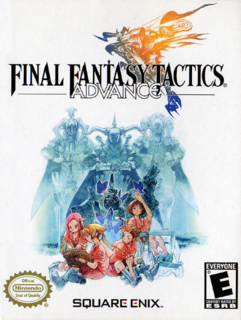Final Fantasy in bite-sized chunks.
Let me begin by emphasizing that this is a terrific example to which all portable games can aspire. The gameplay can generally be broken down into fifteen minute chunks, while longer battles (lasting as long as an hour) can be divided with the game's "save at any time" mentality. The combat is a natural fit to the GBA's small screen and limited buttons - neither of these factors becomes a hindrance. The plot is simple yet entertaining, and the graphics are crisp. The menu-driven interface makes combat less tedious than it could be, though it can sometimes seem cumbersome.
And, if that isn't enough to keep any gamer coming back for more, the addictive RPG elements - leveling up, earning new equipment, learning new abilities - will offer plenty of reasons to return. All of these qualities add up to create a sound base for a portable game. While FFTA is not without its flaws, this foundation pulls it through its most dire moments.
Unfortunately, these moments are not as scarce as one might hope. The combat can become tedious as the game progresses. The mission-based system that serves as the backbone for the gameplay is often surpassed by forced random encounters - enemies that walk about the world map and enemies that attack your clan's area. The first of these can usually be avoided, so that they serve only as an annoyance. The latter, however, must be repelled lest your land be stolen. While random encounters have usually been welcome in the Final Fantasy series, they seem awkward and repetitive here. The strategic nature of the game relies on a variety of enemies and scenarios, and does not hold well against monotonous, straightforward battles against weak opponents.
Random encounters such as these, however, are to some extent necessary for the psuedo-unlimited progression of the clan. It seems that in order to offset this monotony, Square Enix included laws and the Judge system. These basically add a cyclic randomness to the battles, enforcing different laws each day that must be abided by in battle. While some of these laws require new strategy to be implemented - Copycat, for example, bans repetition of the last unit's action - most are mundane and simply require changing jobs or party members before the battle. More often than not, the jobs simply prove as another unnecessary irritation, as it is easy to slip up and have a party member land in jail for a few battles.
Though FFTA is clearly not without its flaws, it has plenty to offer in its favor. Customizing each character with the job system allows for an open-ended clan, and combat with a personalized party proves all the more enjoyable. The combat is, further, easy to begin but difficult to master, and most of the missions are unique and enjoyable.
There is much good to be found within FFTA, though its faults do detract from an otherwise ever-enjoyable experience. All in all, the simple plot, adorable sprites, and building up the greatest clan in Ivalice combine to create an extremely rewarding experience. Those who have not yet delved into turn-based strategy but enjoy a good RPG have been given a perfect gateway into the genre, created by a developer all can trust.

